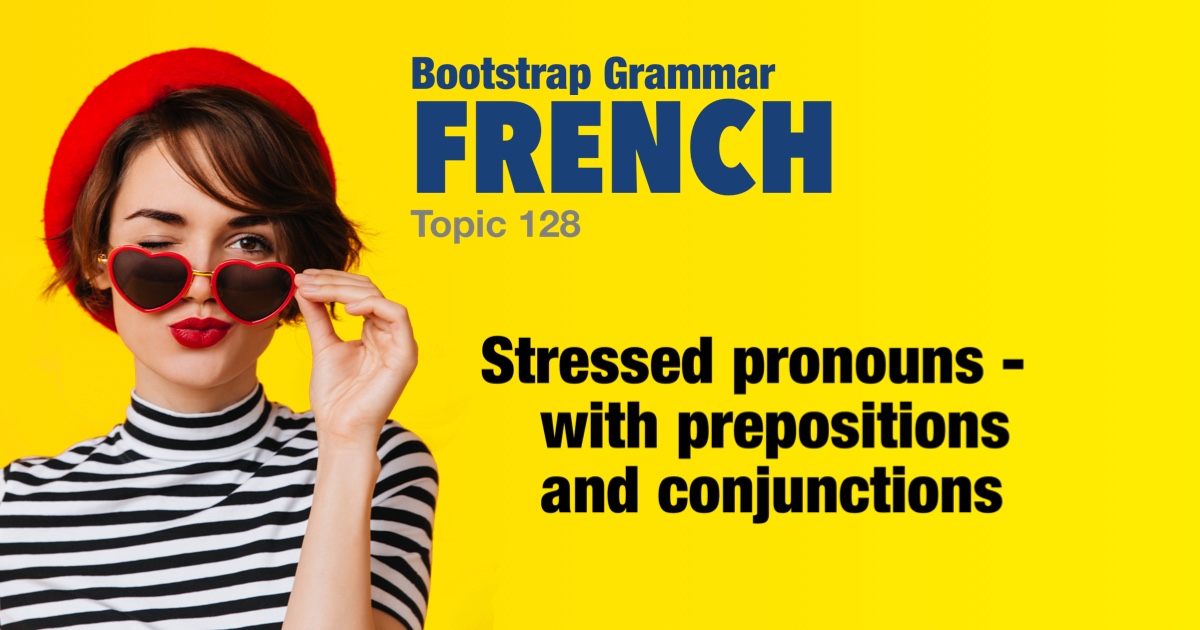French grammar - Stressed pronouns - with prepositions and conjunctions |
|||
|
|||
The French stressed pronouns are: • je ⇒ moi • tu ⇒ toi • il ⇒ lui • elle ⇒ elle • nous ⇒ nous • vous ⇒ vous • ils ⇒ eux • elles ⇒ elles And soi for unspecified persons - typically used with impersonal pronouns such as on, chacun, tout le monde etc. Three common uses of stressed pronouns are: • After many prepositions such as à, par, pour, en, vers, avec, chez, de, sans, etc. • With many conjunctions such as ou, comme, et etc. • With the restrictives ne..que and ne..ni. Note that the stressed pronouns (except soi) can refer only to people and animals. |
| Examples: | |
|
Je viens avec toi.
I am coming with you (familiar).
|
|
|
Elle pense à moi.
She thinks of me.
|
|
|
Je pense aussi à elle.
I also think of her.
|
|
|
Les enfants sont avec leur père - ils jouent avec lui.
The children are with their father - they play with him.
|
|
|
Les gâteaux ont été faits par eux.
The cakes were made by them.
|
|
|
Nous remercions les Dupont - le café est fourni par eux.
We thank the Duponts - the coffee is provided by them.
|
|
|
On va au Japon sans vous cette fois.
We're going to Japan without you (formal) this time.
|
|
|
Mes filles ont du courage - j'ai confiance en elles.
My daughters have courage - I have confidence in them.
|
|
|
Il a un cadeau pour elle.
He has a gift for her.
|
|
|
Il a proposé de le faire pour eux.
He offered to do it for them.
|
|
|
Le lion vient vers moi !
The lion is coming towards me!
|
|
|
Un objet inconnu s'avance vers nous.
An unknown object is advancing towards us.
|
|
|
Elle habite chez toi maintenant ?
Does she live at your (familiar) place now?
|
|
|
Nous avons dîné chez eux.
We had dinner at their home.
|
|
|
Chez elle, il y a une piscine.
At her place, there is a swimming pool.
|
|
|
J'adore le sport, comme vous.
I love sports, like you (formal).
|
|
|
Elle refuse de manger - tout comme toi.
She refuses to eat - just like you (familiar).
|
|
|
Elles peuvent choisir entre lui ou moi.
They can choose between me or him.
|
|
|
Michel et moi jouons au tennis.
Michel and I play tennis.
|
|
|
Ils ne peuvent voir ni elle ni moi.
They can't see me or her.
|
|
|
Je ne pense ni à toi ni à lui.
I don't think of you (familiar) or him.
|
|
|
Je ne connais que lui ici.
I only know him here.
|
|
|
On est chez soi.
Everyone is at their home.
|
|
|
Chacun pour soi.
Each for themselves.
|
|
|
Il faut avoir confiance en soi.
One must have confidence in oneself.
|
|
|
Chacun en soi est également important.
Each in itself is equally important. |
|
|
C'est assez spécial en soi.
It's quite special in of itself. |
|
 |
|


 With the presposition
With the presposition 
